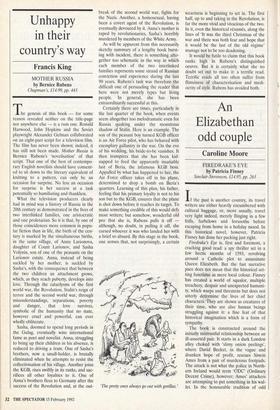Unhappy in their country's way
Francis King
MOTHER RUSSIA by Bernice Rubens Chapman's, £14.99, pp. 443 The genesis of this book — for some reason revealed neither on the title-page nor anywhere else — is a rum one. Ronald Harwood, John Hopkins and the Soviet playwright Alexander Gelman collaborated on an eight-part script for a television film. The film has never been shown; indeed, it has still not been made. Mother Russia is Bernice Rubens's `novelisation' of that script. That one of the best of contempo- rary English novelists should have consent- ed to sit down to the literary equivalent of knitting to a pattern, can only be an occasion for surprise. No less an occasion for surprise is her success at a task potentially so humiliating and thankless.
What the television producers clearly had in mind was a history of Russia in the 20th century as demonstrated in the lives of two interlinked families, one aristocratic and one proletarian. So it is that, by one of those coincidences more common in popu- lar fiction than in life, the birth of the cen- tury is marked by the simultaneous births, in the same village, of Anna Larionova, daughter of Count Larionov, and Sasha Volynin, son of one of the peasants on the Larionov estate. Anna, instead of being suckled by her mother, is suckled by Sasha's, with the consequence that between the two children an attachment grows, which, as they reach puberty, develops into love. Through the cataclysms of the first .world war, the Revolution, Stalin's reign of terror and the second world war, through misunderstandings, separations, poverty and danger, that love survives, symbolic of the humanity that no state, however cruel and powerful, can ever wholly obliterate.
Sasha, doomed to spend long periods in the Gulag, eventually wins international fame as poet and novelist. Anna, struggling to bring up their children in his absence, is reduced to driving a tram. One of Sasha's brothers, now a small-holder, is brutally eliminated when he attempts to resist the collectivisation of his village. Another joins the KGB, rises swiftly in its ranks, and sac- rifices all other loyalties to it. One of Anna's brothers flees to Germany after the success of the Revolution and, at the out-
break of the second world war, fights for the Nazis. Another, a homosexual, having been a covert agent of the Revolution, is eventually devoured by it. Anna's mother is raped by revolutionaries, Sasha's horribly murdered by members of the White Army.
As will he apparent from this necessarily sketchy summary of a lengthy book burst- ing with incident, there is something alto- gether too schematic in the way in which each member of the two interlinked families represents some strand of Russian conviction and experience during the last 90 years. Rubens's task was therefore the difficult one of persuading the reader that here were not merely types but living people. In general, she has been extraordinarily successful at this.
Certainly there are times, particularly in the last quarter of the book, when events seem altogether too melodramatic even for Russia quaking under the monstrous shadow of Stalin. Here is an example. The son of the peasant boy turned KGB officer is an Air Force pilot, who has behaved with exemplary gallantry in the war. On the eve of his wedding, his bride-to-be vanishes. It then transpires that she has been kid- napped to feed the apparently insatiable lust of Beria, the infamous KGB boss. Appalled by what has happened to her, the Air Force officer takes off in his plane, determined to drop a bomb on Beria's quarters. Learning of this plan, his father, feeling that his primary loyalty is not to his son but to the KGB, ensures that the plane is shot down before it reaches its target. To make something credible of this would defy most writers; but somehow, wonderful old pro that she is, Rubens pulls it off although, no doubt, in pulling it off, she cursed whoever it was who landed her with a brief so absurd. By this stage in the book, one senses that, not surprisingly, a certain The pretty ones always go out with gorillas.' weariness is beginning to set in. The first half, up to and taking in the Revolution, is far the more vivid and vivacious of the two. In it, even the historical résumés, along the lines of 'It was the third Christmas of the war and there was both fear and hope that it would be the last of the old regime' manage not to be too deadening.
It would be futile to claim that this book ranks high in Rubens's distinguished oeuvre. But it is certainly what she no doubt set out to make it: a terrific read. Terrific reads all too often suffer from flimsiness of characterisation and medi- ocrity of style. Rubens has avoided both.


























































 Previous page
Previous page